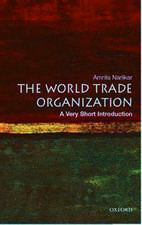Troubled Times: U.S.-Japan Trade Relations in the 1990s
Autor Edward J. Lincolnen Limba Engleză Paperback – mai 1999
In this book, Edward J. Lincoln tackles the thorny issue of U.S. trade relations with Japan, the subject of so much tension in the 1990s. In so doing, he builds on his earlier Brookings book, Japan's Unequal Trade. Lincoln argues that statistical evidence shows only modest progress in diminishing Japan's "distinctiveness." Despite an upturn in the mid-1990s, import penetration, intra-industry trade, and inward foreign direct investment all remain low relative to most other nations. High profile negotiating efforts by both the Bush and Clinton administrations made progress in chipping away at protectionist barriers but fundamental problems remain. While Lincoln offers suggestions on what needs to be done by both sides, the most important lesson drawn from recent experience is that expectations should be lowered. Any feasible approach to making markets more open in Japan is likely to yield slow progress. Such realism--not to be confused with defeatism--is the only approach that has any chance of realizing gains over time.
Preț: 205.43 lei
Nou
Puncte Express: 308
Preț estimativ în valută:
39.31€ • 41.15$ • 32.53£
39.31€ • 41.15$ • 32.53£
Carte tipărită la comandă
Livrare economică 05-19 aprilie
Preluare comenzi: 021 569.72.76
Specificații
ISBN-13: 9780815752677
ISBN-10: 0815752679
Pagini: 321
Dimensiuni: 152 x 229 x 26 mm
Greutate: 0.49 kg
Ediția:New.
Editura: Brookings Institution Press
Colecția Brookings Institution Press
Locul publicării:United States
ISBN-10: 0815752679
Pagini: 321
Dimensiuni: 152 x 229 x 26 mm
Greutate: 0.49 kg
Ediția:New.
Editura: Brookings Institution Press
Colecția Brookings Institution Press
Locul publicării:United States
Notă biografică
Edward J. Lincoln is a senior fellow in Asia and Economic Studies at the Council on Foreign Relations. His previous Brookings books include Arthritic Japan (2001), Troubled Times: U.S.-Japan Trade Relations in the 1990s (1999), Japan's New Global Role (1995), and Japan's Unequal Trade (1990). In the mid-1990s, Lincoln served as special economic advisor to Walter Mondale, former U.S. ambassador to Japan.
Descriere
In this book, Edward J. Lincoln tackles the thorny issue of U.S. trade relations with Japan, the subject of so much tension in the 1990s. In so doing, he builds on his earlier Brookings book, Japan's Unequal Trade. Lincoln argues that statistical evidence shows only modest progress in diminishing Japan's "distinctiveness." Despite an upturn in the mid-1990s, import penetration, intra-industry trade, and inward foreign direct investment all remain low relative to most other nations. High profile negotiating efforts by both the Bush and Clinton administrations made progress in chipping away at protectionist barriers but fundamental problems remain. While Lincoln offers suggestions on what needs to be done by both sides, the most important lesson drawn from recent experience is that expectations should be lowered. Any feasible approach to making markets more open in Japan is likely to yield slow progress. Such realism--not to be confused with defeatism--is the only approach that has any chance of realizing gains over time.















